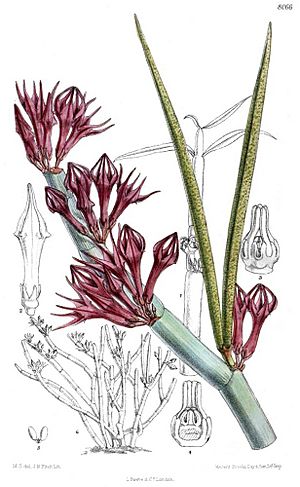Ceropegia fusca facts for kids
Quick facts for kids Ceropegia fusca |
|
|---|---|
 |
|
| Illustration of Ceropegia fusca | |
| Scientific classification | |
| Genus: |
Ceropegia
|
| Species: |
fusca
|
Ceropegia fusca is a unique flowering plant. It belongs to the Ceropegia group of plants. This plant is special because it only grows in the Canary Islands. You can find it on islands like Tenerife, Gran Canaria, and La Palma. It likes to grow in dry, sunny areas. These areas are usually below 600 meters (about 2,000 feet) in height.
Contents
Discovering Ceropegia fusca
This plant was first described by a naturalist named Carl Bolle. He was a German botanist. His work helped us learn more about this interesting plant.
What Ceropegia fusca Looks Like
Ceropegia fusca has straight, woody stems. These stems can grow quite tall. They can reach up to 1.5 meters (about 5 feet) high.
Leaves and Flowers
Its leaves fall off each year. They grow in pairs opposite each other. Each leaf is narrow and about 5 centimeters (2 inches) long.
The flowers are very interesting. They grow in small groups of two to five. These groups appear where the leaves meet the stem. The flowers are shaped like tubes. They are a reddish-brown color. Each flower has five narrow parts. These parts join together at the very tip. Ceropegia fusca flowers mostly in spring and summer.
Fruit of the Plant
After flowering, the plant produces fruit. The fruit is a pair of large capsules. Each capsule can be up to 10 centimeters (4 inches) long.
Growing Ceropegia fusca
People often use Ceropegia fusca as an ornamental plant. This means it is grown for its beauty. It is great for gardens that do not need much water. These are called drought tolerant gardens.
The plant needs hot weather to grow well. It thrives in dry conditions. This makes it a good choice for sunny, warm climates.
See also
 In Spanish: Ceropegia fusca para niños
In Spanish: Ceropegia fusca para niños

